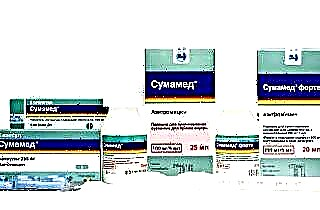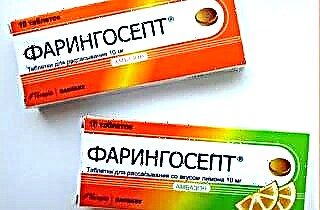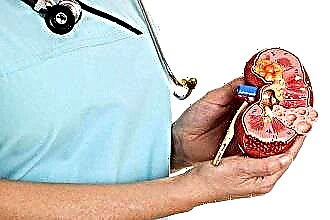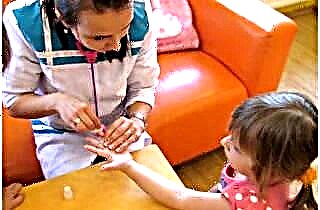Tracheitis is an acute or chronic inflammation of the mucous membranes that line the trachea from the inside. The trachea is a hollow tube slightly more than 10 cm long, which branches in two at the bottom, thus connecting the larynx and bronchi. Therefore, if tracheitis is not treated, then the subsequent development of bronchitis is almost inevitable. But which drug is most effective for tracheitis in adults depends on the cause that caused it.
Causes of tracheitis
Due to the anatomical location of the trachea, which is protected to some extent by the tonsils, tracheitis, as an independent disease, develops extremely rarely. Usually it connects to other respiratory diseases, and therefore is often diagnosed: laryngotracheitis, pharyngotracheitis, etc. In 90% of cases, tracheitis is of an infectious nature.
Factors contributing to the development of the disease in adults are:
 removed tonsils, since the infection freely enters the trachea;
removed tonsils, since the infection freely enters the trachea;- tonsillitis in acute or chronic form - the tonsils not only do not fulfill their protective function, but they themselves serve as a focus of infection;
- chronic respiratory diseases: sinusitis, bronchitis, etc. - weaken the immune system, mucus is constantly present in the larynx and trachea;
- bad habits - systematic smoking and alcohol consumption gradually destroy the mucous membranes and lead to constant intoxication of the body;
- frequent allergic reactions - accompanied by swelling of the larynx and profuse mucus production, which leads to inflammation;
- unfavorable working conditions - polluted air, exposure to the respiratory system of irritating or toxic substances;
- diseases of internal organs - with renal and heart failure, the normal flow of oxygen to the tissues is disrupted, and with diseases of the gastrointestinal tract, the esophagus and trachea are often irritated by the contents of the stomach that enter them;
- hypothermia (general or local) leads to a sharp decrease in immune defense, and inflammation is provoked by opportunistic microflora;
- ingress of a small foreign body - it may not interfere with breathing, but simply stick to the wall of the trachea, but the body will try to bring it out and local inflammation will begin around it.
The development of infectious tracheitis, regardless of the type of pathogen (fungi, viruses, bacteria), significantly accelerates the reduced immunity. The body does not provide adequate resistance and simply cannot restrain the active reproduction of pathogenic microorganisms.
Symptoms of an infectious tracheitis
It is almost useless to treat non-infectious tracheitis with pills. Some of the drugs can only temporarily relieve symptoms, but until the underlying disease is eliminated, the inflammatory process will not completely disappear. Non-infectious tracheitis has the highest probability of becoming chronic, which is difficult to get rid of.
Infectious tracheitis requires immediate intensive treatment, since in itself it is already a signal that the immune system is severely weakened and the inflammation reaches the lower respiratory tract. The characteristic symptoms, which are quite clearly expressed in the acute course of the disease, help to recognize the disease:
 a slight but persistent increase in body temperature - up to 37.5-38.0OWITH;
a slight but persistent increase in body temperature - up to 37.5-38.0OWITH;- persistent paroxysmal cough, dry at first, then wet;
- pus and lumps of mucus that come out when you cough up;
- shortness of breath caused by swelling of the larynx;
- sore throat and hoarseness;
- loss of appetite, pain when swallowing.
The disease can be accompanied by a runny nose and swelling of the nasal mucosa, nausea, vomiting, dizziness, bronchial spasms.
With the fungal nature of the disease, a thin film forms on the inner surface of the trachea, which greatly irritates the mucous membranes and provokes bouts of coughing, and sometimes choking.
Treatment with folk remedies in the case of an infectious nature of tracheitis is ineffective and dangerous. Here it is necessary to use potent drugs that can quickly destroy pathogenic microflora. But first you need to find out its nature, therefore, pills for tracheitis in an adult should be prescribed only by a doctor after a thorough examination and obtaining the results of laboratory tests.
Antibiotic use
For some reason, most people still believe that the best remedy for any sore throat is antibiotics. In fact, sometimes their unreasonable use only exacerbates the course of the disease. For example, in case of candidal tracheitis, antibiotics will destroy a person's own microflora, which at least somehow restrained the growth of fungi.
Antibiotics are prescribed only when, according to the results of bacterial inoculation of mucus, the bacteria that caused the disease are actually found, their type and sensitivity to various types of the drug are determined.
When treating mild forms of tracheitis, antibiotics are prescribed in the form of tablets. Most often these are:
 "Pefloxacin" or its analogue "Abaktal" - refers to fluoroquinolones, the most effective against staphylococci and intestinal bacteria, which can enter the trachea through the esophagus.
"Pefloxacin" or its analogue "Abaktal" - refers to fluoroquinolones, the most effective against staphylococci and intestinal bacteria, which can enter the trachea through the esophagus.- "Amoxiclav", as well as "Amoxicillin", "Augmentin" and other drugs of the penicillin series - have a wide spectrum of action and are capable of destroying most microbes.
- "Clarithromycin" or "Binoclar", "Klacid" - belong to the group of macrolides, are effective in almost all types of infection, can be used in severe conditions, but not in patients with serious renal problems.
- "Vilprofen" - also belongs to the group of macrolides, but it helps only with a certain group of pathogens, its independent use is categorically contraindicated.
- "Sumamed" - antibiotic refers to macrolides, an excellent remedy for the treatment of bronchotracheitis, at the same time contributing to the discharge of sputum. It is produced not only in the form of tablets, but also in the form of a syrup, which makes it easier to take with severe sore throat.
- "Axetin" or other cephalosporins produced in tablets are effective when penicillin antibiotics do not work or the patient has an allergic reaction to them.
These are just a few of the most common pill formulations commonly used to treat tracheitis. Their choice is much wider and each of the antibiotics has its own characteristics, which only a doctor knows in detail about.
Therefore, they should be prescribed strictly individually, taking into account the form and stage of the disease, the age and general condition of the patient, the presence or absence of concomitant diseases and many other factors.
Lozenges
Lozenges give a good therapeutic effect for tracheitis. Moreover, they also help with non-infectious forms of the disease, when it is only necessary to calm the inflamed mucous membranes or relieve a sore throat. Preparations of this group are completely natural, combined (containing plant extracts and medicinal components), as well as with antibiotics.
The main advantage of lozenges is that they act locally, so even drugs with antibiotics practically do not violate the natural microflora of a person and do not suppress the immune defense.
 The effect of their use is observed within a few minutes after resorption and lasts up to several hours, provided that the patient does not eat or drink - does not wash off the active components from the mucous membrane.
The effect of their use is observed within a few minutes after resorption and lasts up to several hours, provided that the patient does not eat or drink - does not wash off the active components from the mucous membrane.
The effectiveness of topical preparations is significantly increased if, before using them, inhalation with a soda solution, herbal decoctions, or even just breathing in steam is made. The procedure will soothe and slightly loosen the mucous membranes, preparing them for the effect of the medicine. But with severe swelling of the larynx, steam inhalations cannot be done - this can provoke an attack of suffocation.
The following lozenges are most effective for tracheitis:
- "Doctor MOM" - plant-based lollipops, which contain extracts of 15 medicinal herbs. They are used for tracheitis, which has arisen against the background of constant throat irritation.
- "Lazolvan" is a drug based on ambroxol, which perfectly copes with any inflammation of the upper respiratory tract, while quickly softening the cough and facilitating the discharge of sputum. Effective for laryngotracheitis and pharyngotracheitis.
- "Alex Plus" is a combined preparation containing a substance that acts directly on the cough center. Quickly relieves attacks of unproductive cough, dilutes phlegm, relieves bronchospasm.
- Mukaltin is one of the most effective natural-based mucolytic preparations. Indispensable when you need to cope with an unproductive cough. The only contraindication to it is individual intolerance.
- "Neo-Angin" is an excellent remedy for cough and sore throat based on plant extracts, it gives good results in the treatment of inflammation of the larynx and tracheitis of a non-infectious nature.
- Travisil is a completely natural pill that quickly relieves sore throat, relieves inflammation, soothes cough. Contains extracts of 15 medicinal herbs.
- Strepsils is a combined preparation that combines a broad-spectrum antibiotic and essential oils. Gives excellent results for infectious tracheitis and other acute respiratory diseases.
 "Faringosept" - a drug specially designed for the effective treatment of pharyngitis and pharyngotracheitis, contains an antibiotic, has excellent anti-inflammatory properties, quickly relieves sore throat.
"Faringosept" - a drug specially designed for the effective treatment of pharyngitis and pharyngotracheitis, contains an antibiotic, has excellent anti-inflammatory properties, quickly relieves sore throat.- Decatilen is a local complex antibiotic that effectively destroys pathogenic bacteria and some types of fungi. Contraindicated in pregnant women.
- "Septefril" - is a local antibiotic, destructive for most pathogenic microorganisms, effective in any type of infectious tracheitis. Its use is undesirable during pregnancy and lactation.
The choice of lozenges in modern pharmacies is huge, and all of them (even products with antibiotics!) Are dispensed without a prescription. Therefore, they can be bought and used at the first symptoms of a cold or acute respiratory viral infection, without waiting for the development of tracheitis.
It should be remembered that these are not just cough drops, but full-fledged medications, which must be used exclusively for their intended purpose and in strict observance of the instructions.
In case of an overdose of lozenges, side effects also appear, as with other medicines.
It will not be possible to finally defeat tracheitis only with the help of pills, even very strong ones. This disease requires complex treatment, which should include gargling, inhalation, cough syrups, as well as drugs that directly affect the underlying cause of the disease.
In an advanced state, tracheitis can lead to partial or complete loss of voice, the development of chronic bronchitis, bronchial asthma, pneumonia and other serious diseases. Therefore, if you find symptoms of tracheitis in yourself, be sure to consult with your doctor, and do not try to remove them yourself with the help of pills.

 removed tonsils, since the infection freely enters the trachea;
removed tonsils, since the infection freely enters the trachea; a slight but persistent increase in body temperature - up to 37.5-38.0OWITH;
a slight but persistent increase in body temperature - up to 37.5-38.0OWITH; "Pefloxacin" or its analogue "Abaktal" - refers to fluoroquinolones, the most effective against staphylococci and intestinal bacteria, which can enter the trachea through the esophagus.
"Pefloxacin" or its analogue "Abaktal" - refers to fluoroquinolones, the most effective against staphylococci and intestinal bacteria, which can enter the trachea through the esophagus. "Faringosept" - a drug specially designed for the effective treatment of pharyngitis and pharyngotracheitis, contains an antibiotic, has excellent anti-inflammatory properties, quickly relieves sore throat.
"Faringosept" - a drug specially designed for the effective treatment of pharyngitis and pharyngotracheitis, contains an antibiotic, has excellent anti-inflammatory properties, quickly relieves sore throat.

